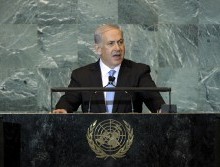The powerful United Nations Security Council endorsed the Iran nuclear deal on Monday, step one towards the “eventual removal” of nuclear sanctions on Iran, according to the UN News Centre. Still to come is a vote to consider removing the sanctions after the International Atomic Energy Agency (IAEA) verifies that Iran has met their requirements. However, while Monday’s initial vote was unanimous for the fifteen-member council, that doesn’t mean that the whole world is behind it.
In fact, Arabs and Israel, the nations most impacted by the deal besides Iran, are apparently among the most opposed. Israeli Prime Minister Benjamin Netanyahu, a vocal objector to the deal, said on Monday, “Many in the Middle East see eye-to-eye with Israel and concur that this agreement is dangerous, dangerous to them, dangerous to the region and dangerous to the world.”
The Washington Post previously reported a Saudi diplomat expressed their opposition to the deal, as one example of those in the region who are not supporting the agreement. The deal exchanges sanctions relief to Iran for increased restrictions and supervision of Iran’s nuclear program. However, the deal has been harshly criticized for its timeframe, as some of the elements of the nuclear monitoring and restrictions end after one or two decades.
Furthermore, Netanyahu is among those concerned that the sanctions relief—absent any requirements about Iran’s support for terrorism—will fuel the Iranian war machine.
“They say that this agreement makes war more distant,” said Netanyahu in his Monday comments, which were released by his office. “This is not true; this agreement brings war closer.
“First, because Iran will receive hundreds of billions of dollars and it is already openly declaring that it will use this money to finance and arm its terrorist movements and its aggression in the region and around the world. Second, there will be a nuclear arms race in the Middle East.”
There is concern that Arab states will seek nuclear weapons as a counterbalance to Iran’s nuclear program, and the Saudi diplomat hinted they may do just that in The Washington Post article.
Netanyahu also assailed the idea that the UN vote vindicates the deal, noting that many have supported bad arrangements in the past, only to see them blow up later—literally.
“History has already proven that when the world is united it is not necessarily right,” said Netanyahu. “Just a few years ago there was broad international agreement on a nuclear agreement with North Korea and today North Korea has approximately a dozen nuclear bombs and it is on the way to attaining many more.”
Netanyahu clearly was troubled by the vote by the UN Security Council (UNSC) on Iran, noting the “hypocrisy” of the vote.
“On the day on which the ruler of Iran has reiterated his intention to destroy the State of Israel, the UN Security Council is giving its approval to that same country, which has systematically violated the UNSC’s decisions and which calls for the destruction of Israel, a member of the UN.”
At the same time, Netanyahu also laid out his response. “The best way to fight this hypocrisy is to tell the truth in a strong and unified manner.”
(By Joshua Spurlock, www.themideastupdate.com, July 20, 2015)

